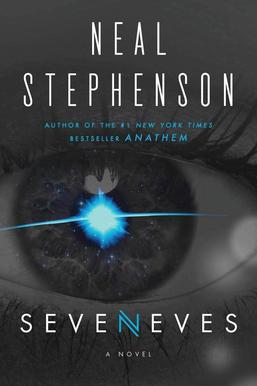CT: Seveneves
So yes, here we are, with my first officially late post in a while. I wish I had a good excuse, guys. Except that I was up late finishing the MOST delicious novel and I thought as recompense for being late, I'd tell you all about it. (My punishment word is palpable because Little C hates me.)
 |
| By Source (WP:NFCC#4), Fair use, https://en.wikipedia.org/w/index.php?curid=46675613 |
Ok so first things first in regards to Neal Stephenson's Seveneves: you have to be into a really specific brand of hard science fiction for this book to work for you. If you read The Martian and thought "What the hell with all the math?!?!", this might be a book to skip. But for me, even as a non-math person, that kind of detail works in so many ways. It makes the near-future of Andy Weir's book feel palpable, like it could happen months from now. And that's even more the case in Seveneves. So much of the book is dedicated to the math and science and physics that are keeping the characters alive minute by minute, year by year.
The premise of the book is that in a near future, the moon explodes. No one's sure quite why it happens, and at first humanity seems fine with the seven pieces hanging in the sky where the moon once stood. But as we start to know characters on both Earth and the International Space Station, a palpable tension builds. You know this isn't going to just be life as usual for much longer. And just like that, the pieces of the moon start to collide, creating a countdown to the day that all of those pieces crash down onto Earth and kill, well, everybody.
The scientists at work in this novel start to rush to get as many people safely off the planet as possible. They expand the space station, start to plan for the rebuilding of the human race, try to find long-term (as in thousands of years) solutions to ensure the survival of the species. And while that could easily feel esoteric and tough to follow, Stephenson gets you inside the scientists' heads as soon and as often as possible. They puzzle through situation after situation, making the math they need to survive into almost a palpable character.
While at times the book feels cold, like a document from a long lost history, the characters imbue the story with a life all its own. One of the astronauts on the space station is a robotics expert named Dinah. Almost without seeing it, we're drawn deeper and deeper into her story until her moments of loss or joy are palpable, even in the documentary-style of writing that Stephenson uses. I was fascinated by the story from the beginning, but it surprised me by the end how much I felt for each character, especially Dinah.
I won't give away too much, because the way the story unfolds is truly beautifully done. Through the details of each scene- the measurements of space, the description of the robots, the minute pieces of information we get about the movements through the spacecraft- creates a palpable world that wrapped around me and I couldn't get enough of. I would honest to goodness read four or five more books set in this universe, telling different pieces of the Seveneves story.
If you're looking for a fascinating, exciting summer read, I can't recommend this one enough.
Happy reading!
CT
CT
Comments
Post a Comment